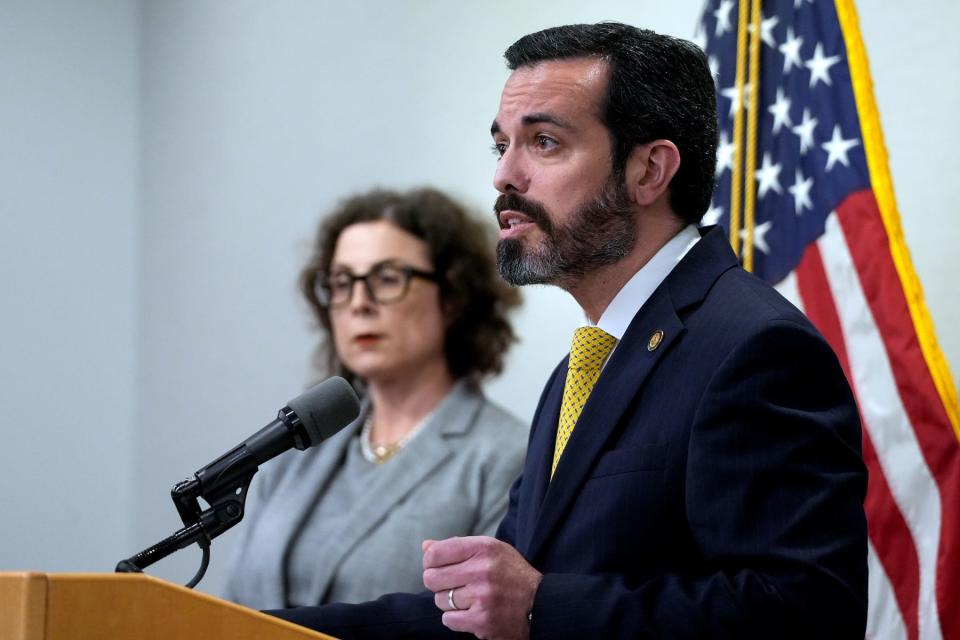We are failing these children, and, frankly, it is unjustifiable | Opinion
Senators Sandra Cano (D-Pawtucket), Alana DiMario (D-Narragansett), Louis DiPalma (D-Middletown) and Joshua Miller (D-Cranston) are all committee chairpersons in the Rhode Island Senate. Sen. Valarie Lawson (D-East Providence) is Senate Majority Whip.
“We are not meeting our shared obligation to some of Rhode Island’s most vulnerable children,” we wrote in 2021, in an opinion piece intended to highlight the urgent need to improve our treatment programs for youth with behavioral health issues, and particularly girls. “This is an emergency. It is also an equity issue that needs to be addressed as soon as possible.”
It is extremely troubling that those same words are just as applicable today as they were when we first wrote them.
On May 13, United States Attorney Zachary A. Cunha described an “appalling failure” of our state to appropriately meet the needs of children with behavioral health issues, particularly girls. He outlined a situation in which hundreds of Rhode Island children were hospitalized, usually at Bradley Hospital, for unnecessarily lengthy periods of time.
We are failing these children, and, frankly, it is unjustifiable.
More: DCYF is removing its kids from St. Mary's Home for Children. What comes next?
So again today, we are calling for urgent action to address this situation. We need to work together — all of us, the legislature, Governor McKee, the Department of Children Youth & Families and the Rhode Island Department of Education — to address the systemic failures that have led to this situation.
First, it is important to say how much we value and respect the work taking place at DCYF and RIDE. We appreciate the difficulty of the jobs they do and their dedication to the children and families in our state.
Let us all work together with increased urgency to provide sustained investments in supportive services throughout the continuum of care, including at home and at school — and in those services between counseling and hospitalization — to ensure our children receive the support they need in the most appropriate settings.
These issues have been, and continue to be, priorities for us in the Senate. We have advanced legislation and conducted several oversight hearings with DCYF and RIDE in our efforts to improve treatment and to ensure that children are receiving quality education regardless of their placement. To that end, it is absolutely imperative that RIDE ensure all children, including those placed at Bradley Hospital, have an educational plan in place.

In the Senate, we have prioritized — and in 2022 the General Assembly provided $57 million to fund — two residential treatment facilities, one for psychiatric treatment and one for behavioral health treatment. While it is important that these facilities are brought online as expeditiously as possible, this will not be enough to solve the problems we are facing, as Mr. Cunha noted.
The General Assembly also appropriated $22.9 million in wage stabilization funds to help DCYF recruit and retain qualified staff. However, these funds were temporary by nature. Another critical step is for the department to enter into new contracts that increase reimbursement rates to providers. These contracts are long overdue, and we hope and expect that they will be awarded soon.
Additionally, we expect that the Senate will again pass legislation (S2705) requiring DCYF to conduct periodic comprehensive needs assessments to determine whether the department’s programs and services meet the needs of children and families in their care, assess client accessibility, and collect data to develop goals and measurable objectives for new and existing programs and services. This data is an important step as we work to strategically improve our systems of care.
More: DCYF discloses death of 1-year-old child, among 14 child deaths already this year
Finally, we need an Olmstead Plan.
The Supreme Court ruled in Olmstead v. L.C. that states must make services available to individuals with disabilities in the most integrated setting possible. That decision was in 1999. While this administration, and prior administrations, have worked towards compliance, we remain the only state in New England, and one of just a few in the nation, that lacks a plan.
Therefore, the Senate is scheduled to consider legislation (S2618) that would create, by statute, an Olmstead Planning Commission to develop this long-needed plan to better serve people vulnerable to unnecessary institutionalization.
Too often, we have made decisions based on short-term budgetary pressures, and that has led us to the insufficient services in place today. However, once in place, better care in more appropriate settings will not just benefit the individuals being served; it is also more cost effective.
The extremely troubling findings by the U.S. Attorney are a reminder that we can and we must prioritize sustained investments throughout our continuum of care to better serve Rhode Island’s most vulnerable children and families.
This article originally appeared on The Providence Journal: U.S. Attorney's report describes "appalling failure" of RI meeting needs of children with behavioral health issues.

